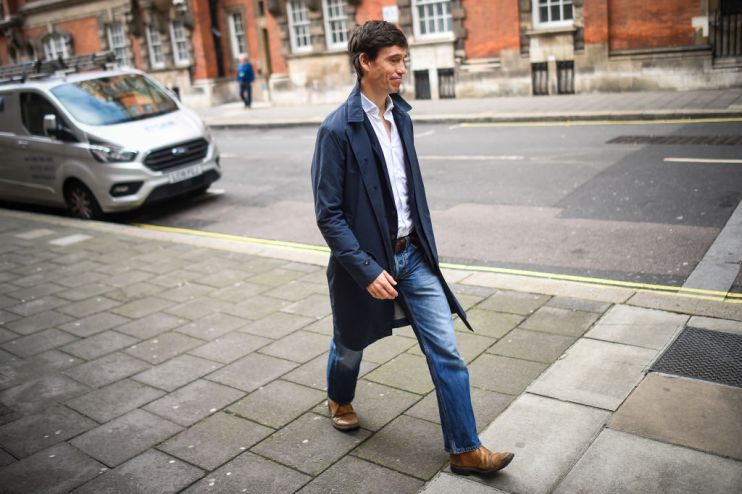Rory walks on with a campaign to spice up the race for London mayor

Watch out London, your favourite selfie-taking, tie-rejecting, accidental-opium-smoking, politician/rambler is coming to a Tube station near you.
Yes, it’s Rory Stewart time once again. For those of us who were mesmerised by the former international development secretary’s short-lived sensation of a campaign to be Tory leader, now we get to enjoy the sequel, after Rory quit his party last Friday to run as an independent for London mayor.
Since then, his campaign has consisted mostly of a grand walking tour of the capital (more manageable than the nationwide trek he attempted over the summer) and an epic social media game.
Rather than making up a fake favourite London pub (as David Cameron made up a fake favourite football team), Rory told an interviewer that he preferred Pret A Manger, and has been tweeting self-deprecatingly about #PretCrawl in the face of the inevitable culture war backlash.
In response to a bizarre online complaint about not showing up somewhere, he apologised with the excuse that one of his team had defected to Venezuela. This is how former diplomats amuse themselves.
Lest anyone think that he isn’t taking things seriously, interspersed between such banter have been serious comments about the looming Brexit negotiations cliff-edge and Turkey’s military offensive on the Kurdish-held region of northern Syria.
Is any of this actually relevant to improving Londoners’ lives, or is Rory (as his critics would paint him) just a lightweight opportunist indulging in quirky conversations with strangers and armed only with colourful anecdotes about his time in the Middle East?
My answer, as a lifelong Londoner, is that it doesn’t matter. Rory has injected some spark and spice into a mayoral election that had up until this point been downright dull.
With just seven months to go, the race has garnered far less attention than in previous cycles. That’s not a surprise – not only has Brexit been sucking up all the political oxygen, but the threat of a General Election has pushed the mayoral race out of the spotlight. Besides, up until last week, a second term for Sadiq Khan looked inevitable.
The opening poll of the contest in December saw Khan starting out with the support of 55 per cent of Londoners – a lead that could, if held, enable him to be the first ever candidate to win the race in the first round by a majority. While the incumbent mayor’s personal approval ratings have slumped since, he was still considered a shoe-in.
His Conservative rival Shaun Bailey had therefore been pretty much written off even by his own side.
Not only did Bailey lack name recognition and media presence, but his campaign was quickly marred with the surfacing of past comments suggesting that young women were promiscuous and that Hindu holidays were linked to crime (unhelpful, given that the Hindu community is usually a key voting bloc for Tories in London).
Many Conservatives seemed to consider him at best, irrelevant – at worst, disappointing.
The shock emergence of a new challenger into the race has had the unintended consequence of galvanising support among Tories for their man.
Rory has been branded by former party colleagues as an entitled and self-serving narcissist, parachuting into the capital with his Remainer agenda, while Bailey is an authentic Londoner committed to tackling the issues that voters really care about, like the rise in crime.
It has also sparked a surprise inversion of the standard culture war, with some traditional Conservatives arguing that a posh white Old Etonian (Rory) has no right to take on an ethnic minority son of a lorry driver (Bailey). Identity politics at its finest.
Khan, meanwhile, has been pushed onto the defensive.
Well-settled in his role as the voice of metropolitan anti-Brexit voters, he now faces a man who quit his own party in protest over the possibility of no-deal, plus the Lib Dem and Green candidates, all fighting for the 60 per cent of London voters who backed Remain in 2016.
Giving speeches against Brexit isn’t enough – Khan is actually going to have to talk about the issues. And from the lacklustre results so far on tackling London’s housing crisis to the endless delays to Crossrail (not to mention knife crime), the Labour mayor’s record is patchy. Sparring with Donald Trump on Twitter isn’t going to cut it.
Not that Rory has clear answers to any of these questions either, of course. His opening gambit to Londoners was simply the promise to listen and a reminder that he helped clear rubbish off the streets in Kabul. But then, that isn’t the point – no one is actually expecting him to win.
Still, that doesn’t mean his candidacy is a waste of time – for himself or for London. Rory is clearly using this race as a way to keep his Brexit message in the spotlight after quitting the Tory party – good for him if it works.
Meanwhile, Bailey’s campaign has been given a shot of adrenaline, Khan is having to raise his game, the other candidates have become more energised, and Londoners are getting the dynamic, passionate mayoral race they deserve.
And if Rory does by some miracle actually win, perhaps his first act as mayor should be licensing opium in London’s shisha bars.
Main image credit: Getty